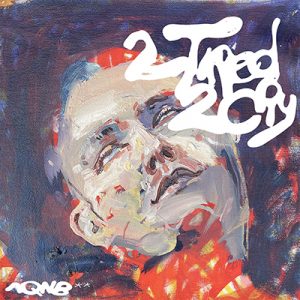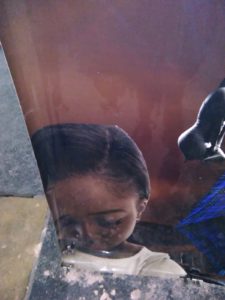In their ongoing exploration of the intersection of Blackness and digitality, poet and artist manuel arturo abreu reviews an EP by n-prolenta which deals with these issues. abreu serves as one of the lyrical sources and titular references (@deezius) of the EP; their poem ‘Love Story’ from List of Consonants (Bottlecap Press, 2015) was excerpted on ‘Bref (denise, beside herself)’.
In August 2016, Fayetteville-based artist n-prolenta (aka Brandon Covington) released a suite of five warped dirges on Purple Tape Pedigree called A Love Story 4 @deezius, neo, chuk, E, milkleaves, angel, ISIS, + every1else…. and most of all MY DAMN SELF.
Built from an austere palette, A Love Story… explores the affective nexus of networked Afrodiasporic pain in a moment of digital hypervisibility and continued, age-old exploitation of Black flesh, wondering what digital Black love might look like when built virtual space relies on such violent subsumption. It’s part of Covington’s multimedia Black Hydra Project, which they describe as “a set of musical compositions, a set of orated poems, an economic reparations crowdfund initiative, and a performance installation project.” As a facet of the project, the EP explores the effect of neoliberal design on the ontology of the African diaspora, the central instruments being the voice and the viola, both mutated heavily in post-processing.
The structure of the music is fragmented and nonlinear — the viola transforming into whorling clicks and windblown hisses; voices emerge in whispers and distorted croaks. It sounds the way time feels after trauma. Covington treats the digital audio workstation itself as an instrument, its transformative capacity mimicking history’s violent, mutating cyclicity — time as a war riddim locked into a groove, slowly disintegrating, a harrowing fractal. The erratic temporal and textural oscillations on each track evoke the intense cadence of a body under stress.
In her forthcoming book, In The Wake: On Blackness and Being, theorist Christina Sharpe notes, “Antiblackness is the weather.” It remains “unremarkable unless spectacular.” The sonic texture of the music builds from this context, interrogating the methods of spectacle and the ways they erase Black suffering. The music simultaneously expresses the damaging feeling of apophenia (seeing patterns in ostensibly meaningless data) and acute isolation that result from noticing the invisible antiblack underbelly of civil society. White respectability convinces the witness of antiblackness (across history and in the present) that what one experiences so consistently and insidiously is not a pattern, but random exceptions to an overall progressive context.
Apopheniac revelry and the disavowal of humanism emerges in opposition to a liberal assimilationist politics of hope and gradual policy reform. Only if one treats the daily, constant evidence of antiblackness as mistaken pattern recognition or delusion can one believe in, and try to ‘improve,’ the tenets of a system deliberately built to exclude and exploit Black bodies. Such hope leads to a kind of existential vertigo, in which one casts about in denial for a guilty party against which the system (the true guilty party) would provide protection. This is most poetically evoked on ‘Bref (denise, beside herself)’, which begins as an anthem hollowed of all glory, sloughing toward a dense Shepard tone (an auditory illusion which results in the perception of infinitely-rising pitch), as well as a distorted, modal arabesque of a viola riff. The lyrics merge Covington’s words with a section of a prose poem by manuel arturo abreu (yours truly). The pain and codependence of the lyrics is redolent of the relationship between Black compliance and civil society: “I hate you because I believe in love. I hate you because I want to control myself. I hate you because I believe you are like me.”
Crafted around a contorted a capella of Bridget Kelly’s ‘I Won’t Cry / Almost More’ (2013), the woozy, lorn ‘Scream Pa Mi’ closes out A Love Story… with a bang. Covington skews their viola into a wet clack to serve as the basis of a deconstructed rhythm which gradually dissolves, letting the vocals take center stage. Kelly sings of being “caught between fantasy and reality,” of the possibility of being “almost more than lovers.” Covington states that the track “is simultaneously an articulation of the present lived as a heartbroken and genderqueer Black teenager in the United States South during the middle of the 2010s as much as it is a fantastic, idealistic visualization of a possible future in such a body.”
As a facet of the Black Hydra Project, this EP attempts to give sonic shape to the fugitive communization of black creativity in shared digital space, in a context where the surveillance of Black American bodies is technologizing into a social media-to-prison pipeline. Through techniques like predictive policing — in which law enforcement is aided by algorithms, online databases, etc — the digital transforms from a space of expression to a disciplinary site of value extraction (as an interesting side note, private prison stocks skyrocketed following Donald Trump’s election). The technologization of surveillance also results in the violent and exploitative ways Black production serves as the unspoken bedrock of American digital culture. Decontextualized and emptied of meaning to the point of exhaustion, Blackness fuels cycles of linguistic and aesthetic fads, eventually discarded — Hito Steyerl’s poor image bruised by circulation. It’s part and parcel of what Keith Obadike, in a 2001 interview, calls the “odd Euro colonialist narrative that exists on the web.” In the face of this, Covington’s compositions are odes against Black disposability, paradoxically comprised of these very tactics of spectacle, out of necessity, asking: can one resist something by embodying it?**
















